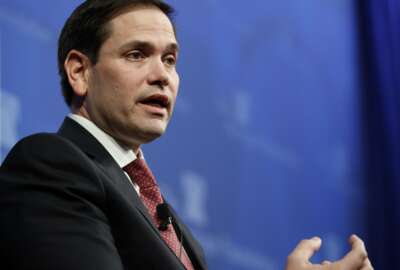After years of delays, the TSP’s I fund will track a new index starting in 2024
After several years of delays and controversy, the TSP’s I fund will transition to tracking a new, broadened benchmark index, but will exclude investments in...
The Thrift Savings Plan’s international or “I” fund will soon look a little different.
Beginning in 2024, and coming after several years of delays and controversy, the TSP’s I fund will transition to tracking a new, broadened benchmark index. The Federal Retirement Thrift Investment Board unanimously approved the change at a board meeting Tuesday.
“By broadening the index, the board is expanding investment opportunities and improving the I fund’s risk-return profile, in line with its statutory mandate and fiduciary duty to the 6.9 million TSP participants,” FRTIB said in a press release Tuesday.
Specifically, the I fund will move to track the MSCI index that captures large, mid and small cap stocks across both developed markets and emerging markets. As the name implies, the new index — the “MSCI All Country World ex USA ex China ex Hong Kong Investable Market Index” — notably excludes investments in China and Hong Kong.
Currently, the I fund tracks the MSCI Europe, Australasia and Far East (EAFE) index.
The adjustment to the I fund will significantly expand the investment portfolio, more than doubling the number of countries included in the fund.
The I fund currently has about $68 billion from TSP participants’ investments. With the new benchmark index, the board said it expects the change to improve the I fund’s overall performance in the long run.
FRTIB first made a decision to expand the I fund to an emerging markets benchmark back in 2017 and planned to implement the change in 2020. But the board’s plan gained strong pushback from members of Congress and the Trump administration because at the time, the board was planning to include investments in China as part of the new I fund benchmark index.
In 2019, Florida Republican Sens. Marco Rubio and Rick Scott raised concerns to former President Donald Trump about the planned investments in China, saying the board’s decision to move the I fund to a new benchmark would expose federal retirement assets to potentially unethical and harmful Chinese companies.
“This decision by the Federal Retirement Thrift Investment Board to invest the Thrift Savings Plan’s international fund in an index, which includes newly registered Chinese companies, ignores a previous request from Congress to act more prudently with civil servants’ savings,” Rubio and Scott wrote in a letter to Trump in 2019.
The FRTIB has maintained that it manages federal employees’ retirement assets, which are not property of the U.S. government. TSP participants themselves choose where to invest their savings, not the board or Congress.
But in response to lawmakers’ concerns in 2019, as well as a Trump directive, the board delayed implementation of the change to a new index.
Ultimately, the board opted to exclude investments in China and Hong Kong in the upcoming transition to the new benchmark index.
The board’s investment consultant Aon said the decision to exclude China and Hong Kong from the I fund was due to possible market volatility among unforeseen events, such as investment restrictions on Chinese technology sectors.
“If the current investment restrictions on China are the beginning of further restrictions spanning China and Hong Kong investments, this level of uncertainty can outweigh the benefits of expanding the I fund to include China and retaining exposure to Hong Kong, based on the TSP’s specific circumstances,” Aon said.
The National Active and Retired Federal Employees Association (NARFE) expressed support for the market expansion that will become available to TSP participants.
“It’s going to go beyond the European and Canadian investments and get into more emerging markets, getting a little bit more diversified investments for TSP participants, but it still takes out areas where there is a lot of controversy,” John Hatton, NARFE’s staff vice president for policy and programs, said in an interview on Fed Life. “I think it’s a good new sign that allows people to have a little bit more exposure to more markets without those controversial provisions.”
But concerns from Congress over TSP investments have not gone away. Earlier this year, Rubio introduced an amendment to the 2024 National Defense Authorization Act, which attempted to block TSP investments from going to China by way of the new mutual fund window. The amendment ultimately received 55 votes, falling short of the 60-vote threshold, and was not included in the NDAA.
Copyright © 2025 Federal News Network. All rights reserved. This website is not intended for users located within the European Economic Area.
Drew Friedman is a workforce, pay and benefits reporter for Federal News Network.
Follow @dfriedmanWFED






